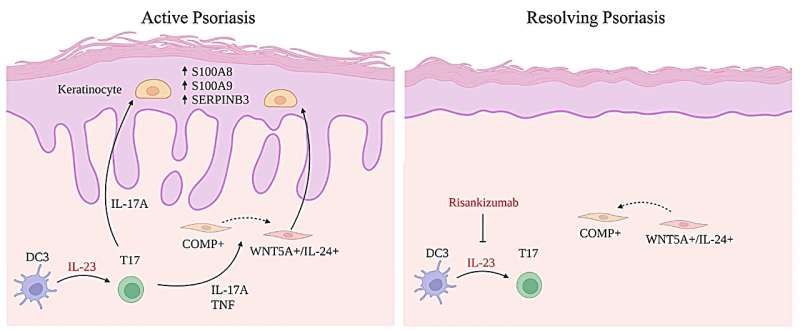This article has been reviewed according to Science X's editorial process and policies. Editors have highlighted the following attributes while ensuring the content's credibility:
fact-checked
trusted source
proofread
Understanding early effects of psoriasis drug offers potential for personalized treatment

Academic researchers from King's College London have investigated the early effects of an immunosuppressant drug that could help clinicians with future personalized approaches for the treatment of psoriasis.
The paper, "Single-cell analysis of psoriasis resolution demonstrates an inflammatory fibroblast state targeted by IL-23 blockade," is published in Nature Communications.
Psoriasis is a chronic skin disease that affects between 1 and 2 million people in the U.K. It can affect people in their early teens and last throughout their lifetime. It is incurable and can develop into a severe and debilitating condition.
People with severe psoriasis may take immunosuppressant drugs, including biologics, which are injectable drugs that target specific proteins in the body. Patients can face a higher risk of developing infections while taking these medications, and many question whether they have to continue their treatment once their psoriasis has cleared up. As a result, some individuals stopped taking these drugs during the COVID-19 pandemic, which increased the chances of their psoriasis getting worse.
"We knew that biologics blocking the inflammatory protein IL-23 are extremely effective drugs. However, we did not understand what happens in the skin of affected individuals in the days and weeks after starting treatment," says Professor Francesca Capon, a professor of immunogenomics at King's.
The researchers studied the early effects of one biologic drug, the IL-23 inhibitor risankizumab, on patients' skin. They took skin samples from five individuals with severe psoriasis and studied their cells at the start of treatment and then again after three days and two weeks of receiving the drug. More than 160,000 individual skin cells in total were profiled in the study using single-cell sequencing.
The researchers found that fibroblasts (a type of skin cells) started to show less inflammation within just three days of treatment. Monitoring cells like the fibroblasts may help clinicians understand whether an individual is still responding to treatment and could therefore reduce their dose.
"The study shows that the drug is affecting skin cells well before its effects become clinically apparent. Key to the insights gained on these early changes in the skin has been the generosity of the patients who participated in the study. We are very excited about the future use of single-cell technologies for understanding drug effects and advancing outcomes for people with psoriasis," says Dr. Satveer Mahil, reader at King's and Consultant Dermatologist at St John's Institute of Dermatology.
More information: Luc Francis et al, Single-cell analysis of psoriasis resolution demonstrates an inflammatory fibroblast state targeted by IL-23 blockade, Nature Communications (2024). DOI: 10.1038/s41467-024-44994-w




















